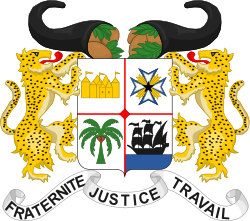 |
|---|
| |
Elections for the National Revolutionary Assembly were held in Benin on 10 June 1984. They were originally scheduled for 1983, but the term of the Assembly was extended by 18 months. [1] At the time, the country was a one-party state under the People's Revolutionary Party of Benin, with voters given the choice of approving the party's list of 196 candidates (reduced from 336) or not. The list was ultimately approved by 98.2% of voters, with a 93.1% turnout. [2] Following the election, Mathieu Kérékou was elected President (unopposed) by the Assembly on 31 July. [3]